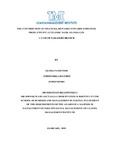| dc.contributor.author | Namutebi, Gloria | |
| dc.date.accessioned | 2020-09-10T21:48:10Z | |
| dc.date.available | 2020-09-10T21:48:10Z | |
| dc.date.issued | 2018-02 | |
| dc.identifier.citation | Namutebi, Gloria (2018) The contribution of Financial Rewards towards Employee Productivity at Stanbic Bank Uganda Ltd: A case of Nakasero Branch | en_US |
| dc.identifier.uri | https://hdl.handle.net/20.500.12305/896 | |
| dc.description | A dissertation submitted to the School of Business and Management in Partial Fulfilment of the Requirements for the Award of a Master’s Degree in Management Studies (Financial Management) of Uganda Management Institute | en_US |
| dc.description.abstract | The purpose of this study was to investigate the contribution of financial rewards towards employee productivity in commercial banks with specific focus on Stanbic Bank Uganda. The study was guided by the following objectives; to establish the relationship between direct financial rewards and employee productivity; and to assess the impact of indirect financial rewards on employee productivity. The theory that informed the study was the Herzberg, (1959) theory of motivation. In addition, the study was conducted using a descriptive cross sectional survey design. A sample of 113 respondents was chosen from a population of 178 to act as a representative sample. On the basis of sampling techniques, the study employed purposive and simple random sampling techniques. The research methods used in this study were questionnaire and interviewing and complimented by documentary review. On the basis of findings, it was found that there was a positive relationship between direct financial rewards and employee productivity Pearson’s correlations coefficient (r) = .722, p < .01. In addition, on the basis of the second study objective, there is a weak but positive relationship between indirect financial and employee productivity given the Pearson’s correlations coefficient (r) = .404, p < .01. Using multiple regression direct financial rewards predicted more employee productivity at 29% than indirect financial rewards 4.7%. The study recommended that; indirect financial rewards should be intensified since it had the lowest predictor value of 4.7% using the multiple regression analysis. This study recommends that more emphasis should put on enhancing indirect financial rewards to so its relationship with employee productivity is strong. SBU should put in place medical schemes or benefits since the Health of the workforce is intricately connected to the productivity of the personnel and the health of the nation’s economy. Housing allowance/facilitation in not given as per the findings of the study, therefore, the Bank should mainstream housing allowance to all employees other than top management. The Banks should systematically phase out trainings that are cost shared since employees perceive them as expenses that erode their salaries. | en_US |
| dc.language.iso | en | en_US |
| dc.publisher | Uganda Management Institute | en_US |
| dc.subject | Financial Rewards | en_US |
| dc.subject | Employee Productivity | en_US |
| dc.subject | Stanbic Bank Uganda Ltd | en_US |
| dc.subject | Stanbic Bank Uganda Ltd - Nakasero Branch | en_US |
| dc.subject | Uganda | en_US |
| dc.title | The contribution of financial rewards towards employee productivity at Stanbic Bank Uganda Ltd: A case of Nakasero Branch | en_US |
| dc.type | Thesis | en_US |

